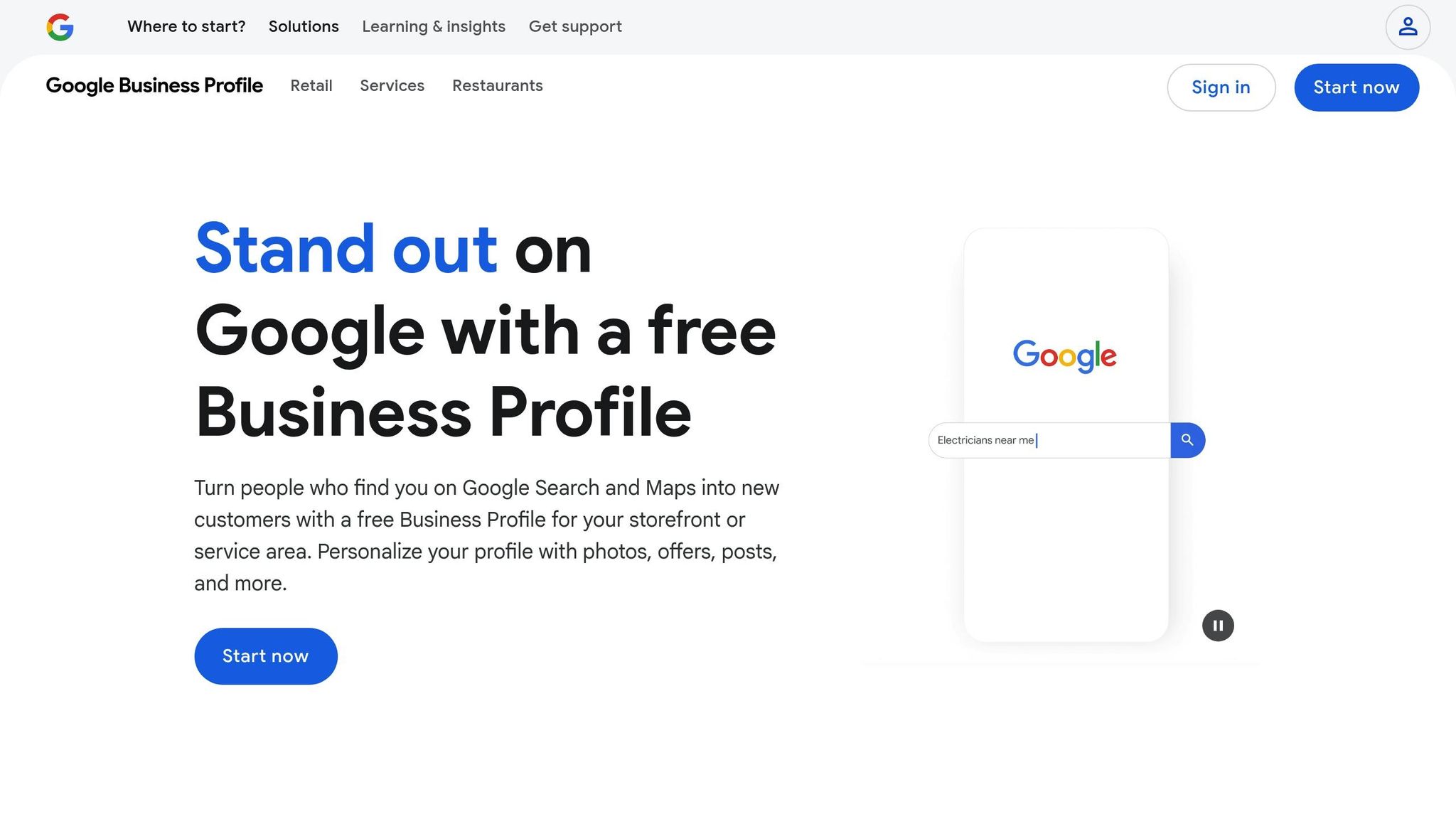Want your NYC startup to stand out online? Here’s the deal: SEO isn’t optional – it’s crucial. With over 9,000 startups competing in a $147 billion market, ranking high on Google can be the difference between thriving and being invisible.
SEO helps you:
- Reach local customers: 46% of NYC residents search for local businesses daily, and 77% of those searches lead to visits within 24 hours.
- Compete with bigger brands: Target specific keywords and dominate your niche.
- Build lasting visibility: Unlike ads, SEO keeps working long after you stop spending.
This guide breaks down:
- How to optimize your Google Business Profile for local searches.
- The importance of location-specific keywords.
- Practical tips for local citations, content creation, and technical SEO tailored to NYC’s fast-paced market.
Pro tip: Mobile optimization is non-negotiable – 92% of NYC locals use smartphones for searches. Ready to grow your online presence? Let’s dive in.
SEO for startups in under 10 minutes
NYC Local SEO Basics
Local SEO is all about fine-tuning your online presence to attract customers searching for businesses in your area. For startups in NYC, where competition is fierce, local SEO isn’t just helpful – it’s essential. Nearly half of all Google searches (46%) are localized queries. Think about it: when someone types "marketing agency in Brooklyn" or "fintech startup near Wall Street", you want your business to be the first name they see.
"Local SEO is more than a buzzword; it’s a necessity for businesses in NYC. It ensures that when people search for services, your business appears in local results." – Hozio
The beauty of local SEO is that it allows startups to compete with larger companies by focusing on location-specific strategies. Let’s explore the key elements that can help your NYC startup stand out.
Google Business Profile for Local Visibility

Your Google Business Profile (GBP) acts as your online storefront on Google. For NYC startups, this free tool can be a game-changer. Did you know that 64% of customers use Google Business Profiles to find contact details? Even more impressively, 84% of profile views come from discovery searches like "pet groomers near me". A polished and complete GBP not only boosts your visibility but also builds trust – businesses with optimized profiles are 2.7 times more likely to be seen as reputable.
"A Business that is not on Google My Business is a Business that does not exist." – Carolina Graells Jmelnitsky, Online Marketing Department at Ibericus Inc
To make the most of your GBP, ensure every section is filled out: your business name, address, phone number, website, hours, products or services, and a description packed with relevant keywords. Use this space to highlight what sets your startup apart. For example, one local café saw its local search visibility jump by 120% and foot traffic increase by 110% after optimizing its GBP. Similarly, a neighborhood barber shop reported an 80% surge in booking inquiries.
Keep your profile active by posting updates about new services, promotions, or milestones. Enable messaging so customers can contact you directly, and always respond to reviews – whether they’re glowing or critical – to show that you care about customer feedback. Once your GBP is in top shape, the next step is to focus on local citations.
Local Listings and Citations
Consistency is crucial when it comes to your business’s Name, Address, and Phone number (NAP). Make sure your NAP is identical across all platforms, from your website to directories like Yelp, TripAdvisor, and Yellow Pages. Even small discrepancies can confuse search engines and hurt your rankings.
A strong local citation strategy can significantly boost your organic search traffic – up to 24%. Start with high-authority directories like Yelp, TripAdvisor, Yellow Pages, Moz Local, and BrightLocal, as well as any directories specific to your industry. Regularly check and update your listings to ensure the information is accurate. Outdated details not only frustrate potential customers but can also harm your credibility.
Building Your SEO Foundation
Creating a solid SEO foundation for NYC startups involves three key pillars: targeted keyword research, on-page optimization, and technical SEO.
Local Keyword Research for NYC Startups
Understanding the NYC Search Landscape
"Local keyword research shows you exactly what nearby customers are typing into Google when they need your service."
- Andrew Shum, Head of SEO, SeoProfy
Effective local SEO begins with thorough keyword research. For NYC startups, this means focusing on two types of keywords: explicit keywords (like "marketing agency in Manhattan") that directly mention a location and implicit keywords (like "top marketing agency") that still imply local intent.
The Three-Part Keyword Formula
Every local keyword typically includes three components: a modifier, a core term, and a location – for example, "affordable web design in SoHo".
How to Conduct Keyword Research
Start by identifying your core services. For instance, a fintech startup might focus on terms like "financial planning", "investment app", or "cryptocurrency consulting." From there, add modifiers like "near me", "in NYC", or "24/7" to capture a range of user intents. Tools like Google Autocomplete and the "related searches" section can reveal additional keyword opportunities. For deeper insights, platforms like Semrush, Ahrefs, or Google Keyword Planner are invaluable.
Real-World Example
Joe’s Coffee Shop in Brooklyn saw a 35% increase in website traffic and a 20% boost in foot traffic within six months by optimizing keywords for Williamsburg and Greenpoint.
Finding Keyword Gaps Through Competitor Analysis
Analyze your competitors’ websites, focusing on service pages, FAQs, and even customer reviews to uncover untapped keyword opportunities.
Once you’ve identified the right keywords, the next step is to integrate them effectively into your website.
On-Page Optimization Best Practices
Smart Keyword Placement
Place your researched keywords strategically in key areas like page titles, H1 headings, meta descriptions, opening paragraphs, and image alt text. However, avoid overloading your content with keywords, as this can hurt readability and SEO.
Content That Speaks to NYC Audiences
Create content that resonates with New Yorkers. Instead of generic phrases like "urban startups", reference specific locations or challenges, such as navigating from Wall Street to Silicon Alley. Use US English conventions, display business hours in Eastern Time, and format dates as MM/DD/YYYY to align with local expectations.
Schema Markup for Local Businesses
Add local business schema markup to supply search engines with structured details about your business, such as your name, address, phone number, and operating hours. This can help your business stand out in local search results and rich snippets.
In-Depth, Relevant Content
Offer detailed content that addresses the unique challenges NYC startups face. Whether it’s a guide to local regulations, tips for networking in the city, or advice on finding office space in different boroughs, well-researched content can establish your authority and improve search visibility.
Technical SEO Requirements
Technical SEO ensures your website performs well and meets the expectations of NYC users.
Speed and Mobile Optimization
NYC users expect fast, seamless experiences. To meet these demands, focus on optimizing your site’s speed by compressing images, reducing HTTP requests, enabling browser caching, and using a content delivery network (CDN). Ensure your website is fully responsive and performs well on smartphones and tablets. Regularly test your site to identify and resolve mobile performance issues.
Improving Crawlability and Indexation
Make your site easy for search engines to crawl by submitting an XML sitemap, maintaining a clear site structure, and using internal links effectively. Use tools like Google Search Console to monitor for crawl errors and resolve them quickly.
Advanced Structured Data
Beyond basic schema, consider adding structured data specific to your industry. For example, a restaurant can use restaurant schema, while service providers can implement service-area markup. This added context helps search engines match your site to relevant searches.
Regular Technical Audits
Perform regular SEO audits to catch and fix issues like broken links, duplicate content, and slow-loading pages. Services like SearchX’s technical SEO offerings can simplify this process and keep your site performing at its best.
Local Technical Details
Consistency is key for local SEO. Ensure your NAP (Name, Address, Phone) information is displayed consistently across all pages. If your audience includes speakers of multiple languages, use hreflang tags appropriately. For businesses serving multiple NYC neighborhoods, create dedicated location pages with tailored content and localized keywords.
Local SEO Implementation Steps
Follow these steps to improve your local visibility and connect with NYC customers. These actions build on the foundation discussed earlier, helping your NYC startup stand out locally.
Google Business Profile Optimization
Think of your Google Business Profile (GBP) as your online storefront for local customers. Accurate and complete business information increases your chances of appearing in local search results, making this one of your most powerful local SEO tools.
Setting Up Your Profile
Start by claiming your Google Business Profile and filling out every detail: business name, address, phone number, website, and operating hours. Profiles with photos receive 42% more requests for directions and 35% more website clicks compared to those without.
Add high-quality photos of your workspace, team, and services, and include shots featuring recognizable NYC landmarks to make your profile more relatable to local customers.
Keeping Information Fresh
Regular updates not only improve rankings but also attract more customers. Update your business hours promptly for holidays or special events, and post weekly updates about new services, milestones, or industry news to keep your profile active.
Reviews and Engagement
64% of customers use Google Business Profile to find contact details for local businesses, and 71% say reviews influence their decision to choose a business. Encourage happy customers to leave reviews by sending follow-up emails after successful interactions.
Respond to all reviews quickly – thank customers for positive feedback and address negative reviews calmly and professionally. Google considers factors like relevance, distance, and popularity in local rankings, and active engagement with reviews signals that your business is responsive and credible.
Local Business Schema Markup Setup
While optimizing your profile is crucial, adding structured data helps search engines better understand your business. Local Business Schema provides search engines with detailed information about your business.
Choosing the Right Schema
For most NYC startups, the LocalBusiness schema works well. However, if you operate a restaurant, medical office, or retail store, use specific schema types like Restaurant, MedicalOrganization, or Store.
How to Implement Schema
Google recommends using JSON-LD for its simplicity. You can generate schema markup via online tools or code it yourself. Include these key properties:
| Property | Description |
|---|---|
name |
Your exact business name |
address |
Complete NYC address with zip code |
telephone |
Phone number in (XXX) XXX-XXXX format |
openingHours |
Business hours in standard format |
url |
Your website URL |
description |
A brief overview of your services |
Testing and Maintaining Schema
After adding schema markup to your website, use Google’s Rich Results Test to ensure everything is functioning properly. A 2025 study by Aiso found that schema-marked pages were more likely to appear in AI-generated summaries, showing the value of structured data in communicating key business details.
Regularly review and update your schema to reflect any changes. For more detailed guidance, SearchX’s local SEO services offer tools to simplify the process.
Online Reputation Management for NYC Startups
Your online reputation is directly tied to your visibility in local search results and your ability to attract customers. 86% of consumers read reviews before choosing a local business, making reputation management a must for startups in NYC’s competitive market.
Monitoring Your Reputation
Set up Google Alerts to track mentions of your brand online. Assigning a community manager to handle your online presence can make a big difference.
Monitor reviews across platforms like Google, Yelp, Facebook, and industry-specific sites. Consumers read an average of 10 reviews before trusting a business, so maintaining a strong, consistent presence across multiple platforms is essential.
Generating and Responding to Reviews
70% of customers will leave a review if asked. Create a system to request reviews, such as follow-up emails or adding a request to your email signature. Since 40% of consumers only consider reviews from the last two weeks, aim to get a steady flow of new reviews instead of relying on older ones.
Timely responses are key: 45% of consumers are more likely to visit a business that addresses negative reviews. Respond to all reviews within 24 hours if possible, and prioritize social media complaints, as 42% of users expect a response within an hour.
Building a Long-Term Reputation
Feature positive reviews in your marketing materials and on social media. Address negative feedback by identifying the issue and making changes to prevent it from happening again. 57% of consumers will only buy from businesses with four or more stars, so maintaining high-quality service is crucial.
To strengthen your reputation further, join local business associations and participate in NYC community events. These activities often lead to positive mentions and local backlinks, which not only enhance your reputation but also boost your local SEO. With these strategies, your startup can thrive in NYC’s competitive digital environment.
sbb-itb-880d5b6
SEO Tools and Services for NYC Startups
Having the right tools and services can make a big difference in boosting your local search rankings. With organic search driving 53% of all website traffic, choosing solutions that align with your startup’s budget and goals is crucial in NYC’s ultra-competitive market.
Top SEO Tools for NYC Startups
In a city as competitive as New York, your approach to SEO – whether you go the DIY route or hire professionals – can directly influence your local visibility. Startups in NYC need tools that address both general SEO needs and the specific challenges of local optimization. This includes keyword research, content creation, on-page strategies, technical fixes, and link building.
Free Tools to Get Started
Start with Google’s free tools. Google Analytics helps you track website traffic and even pinpoint which neighborhoods bring in the most visitors. Google Search Console reveals which local keywords are driving traffic and flags technical issues. Meanwhile, Google Business Profile Insights shows whether customers are finding you through direct searches or by browsing local categories.
Paid All-in-One Solutions
If your budget allows, premium tools like Semrush and Ahrefs are excellent options. Both are highly rated, with scores above 4.5/5. Ahrefs is often praised for its affordability and strong competitor analysis features, while Semrush stands out for its customizable dashboards. These platforms can help you identify NYC-specific keywords, track competitors, and monitor rankings for terms like "fintech startup Manhattan" or "Brooklyn tech consulting."
Tools for Local SEO
For startups focusing heavily on local search, SearchX’s DIY local SEO tools are worth exploring. They specialize in features like local citation management, optimizing your Google Business Profile, and researching location-specific keywords. Additionally, Screaming Frog, rated 4.7/5 on G2, is invaluable for spotting technical issues that could hurt your NYC location pages or cause missing local business schema markup. These tools complement your local optimization efforts, making it easier to track results.
DIY SEO vs. Professional Services
Choosing between DIY SEO and professional services depends on your startup’s time, budget, and expertise. Studies show that businesses investing in SEO see an average ROI of 122%.
| Aspect | DIY SEO | Professional SEO Services |
|---|---|---|
| Cost | Lower upfront cost | Higher initial investment |
| Time Commitment | High (20+ hours/week) | Minimal (2–3 hours/week) |
| Learning Curve | Steep (3–6 months to see results) | Minimal (experts handle it) |
| Control | Full control | Limited direct control |
| Speed of Results | Slower (6–12 months) | Faster (3–6 months) |
| Local Expertise | Requires research and testing | Immediate access to experts |
When to Go DIY
DIY SEO can work well for startups on a tight budget, especially if you’re willing to invest time in learning the ropes. Using the right tools, NYC startups can save on PR costs while reaching new audiences. Start by optimizing your Google Business Profile, creating content around local events, and ensuring your site is fast and mobile-friendly.
Why Choose Professional Services
Startups that invest in professional SEO often see conversion rates 12.2% higher than those that don’t. In NYC’s competitive market, professionals bring advanced strategies and local expertise to the table. Costs can vary widely – freelancers typically charge $75–$150 per hour, while agencies often require monthly retainers starting at $1,000–$3,000. For larger campaigns, costs can run $5,000–$10,000+ per month. Be cautious, though – some agencies may label themselves as SEO experts but lack true specialization.
A Combined Approach
Many NYC startups find success by blending both methods. Handle tasks like content creation and social media in-house, while outsourcing technical SEO audits and link building to experts. SearchX’s SEO solutions offer flexible plans that can grow alongside your startup.
SEO Performance Tracking and Measurement
Once you’ve implemented the right tools and strategies, tracking your performance is critical to ensure you’re seeing results. With 68% of online experiences starting with a search engine, monitoring your progress is essential to capturing valuable local traffic.
Key Metrics to Watch
To gauge success, focus on metrics like organic traffic, keyword rankings, and click-through rates (CTR). Organic traffic shows how many people find you through search, but it’s the quality of that traffic – driven by targeted local searches – that matters most. The top result on Google’s SERPs typically gets about 27.6% of all clicks. Tools like Google Search Console can help you track your CTR and understand how appealing your search listings are. Keep in mind that even a three-second delay in load time can increase bounce rates by 32%.
Setting Up Tracking Systems
Google Analytics is a trusted tool for segmenting NYC traffic and setting conversion goals. It’s widely used, with a 4.5/5 star rating on G2 from over 6,300 reviews. Use it to generate monthly reports that monitor organic traffic, keyword rankings, and conversions. Don’t forget to track local citations and Google Business Profile metrics to measure your local visibility.
Advanced Tracking Techniques
For more detailed insights, tools like Moz (rated 4.3/5 on G2) can help you monitor domain authority and backlinks, ensuring you build strong connections with other NYC businesses and publications. As search engines increasingly rely on AI, it’s also important to track how your content performs in featured snippets and voice search results. These factors are becoming more critical for local searches.
SearchX’s SEO performance tracking tools can consolidate all these metrics into a single dashboard, making it easier to spot trends and adjust your strategy as needed.
Conclusion: Staying Competitive in NYC’s Market
If you’re running a startup in New York City, your SEO strategy needs to keep up with the city’s fast-changing digital scene. With 75% of users never scrolling past the first page of Google results, nailing your local SEO from the start isn’t just important – it’s essential.
SEO delivers a proven return on investment, often outperforming PPC campaigns, especially for startups working with limited budgets.
Key Points to Remember
Thriving in NYC’s competitive market means understanding that 46% of all Google searches have local intent. This highlights the importance of reaching customers who are actively searching for businesses in specific neighborhoods across the city.
Your local SEO success depends on three main elements: consistent optimization, ongoing monitoring, and community engagement. Keep your Google Business Profile up to date, as 92% of people believe responding to customer reviews is part of great customer service.
In a city as fast-paced as New York, mobile optimization is critical. With over 60% of local searches happening on mobile devices and 77% of people conducting a local search on their smartphone visiting a related business within 24 hours, having a mobile-friendly presence is non-negotiable. Local businesses that embrace region-specific marketing strategies see a 23% higher engagement rate, which is especially relevant in NYC, the second-largest advertising market in the U.S., generating over $18 billion in revenue.
"In New York City, you don’t just follow trends – you set them." – Gary Vaynerchuk, CEO of VaynerMedia
To stay ahead, you’ll need to regularly review your performance and adjust your strategy to keep up with ever-changing algorithms and the dynamic NYC market.
Next Steps for SEO Success
SEO takes time, so the best time to start is now. Begin by reviewing your Google Business Profile and ensuring your LocalBusiness schema markup is properly implemented, as discussed earlier in this guide.
Set up a monthly schedule to analyze metrics like organic traffic, keyword rankings, and user engagement using tools like Google Analytics and Google Search Console. Make it a habit to monitor and respond to reviews weekly, as 42% of users frequently read online reviews when searching for nearby businesses.
Strengthen your connections within NYC’s business ecosystem by joining local chambers of commerce, attending industry networking events, and contributing guest posts to local publications. These efforts can generate valuable backlinks and drive referral traffic.
Decide whether to manage SEO yourself or hire professionals based on your resources. If you’re willing to learn and have the time, start with the basics and scale up gradually. If you need faster results, investing in professional services can be a smart move.
SearchX’s SEO solutions offer flexible options tailored to startups, from basic local SEO to comprehensive campaigns. Whether you go DIY or bring in experts, consistency is key.
NYC’s competitive market rewards businesses that act quickly and stay adaptable. By putting these strategies into action today, your startup can build a strong online presence, compete with established players, and carve out a spot in New York’s thriving digital economy.
FAQs
How can startups in New York City use location-specific keywords to boost their local SEO rankings?
Startups in New York City can level up their local SEO game by weaving location-focused keywords into their website content, meta tags, and Google Business Profile. Think about incorporating neighborhood names like SoHo or Chelsea, boroughs such as Manhattan or Brooklyn, and broader terms like NYC to make your content resonate with local audiences.
Another smart move is to target long-tail keywords that tap into local interests, events, or customer searches. For instance, phrases like best coffee shop in Williamsburg or tech startups near Flatiron District can bring in highly specific and relevant traffic. To make your business even more visible, consider adding local business schema markup. This structured data helps search engines understand key details about your business, such as your address, phone number, and hours of operation.
By fine-tuning your keywords to reflect NYC’s vibrant and diverse market, you can connect with local customers and carve out a niche in the city’s bustling startup scene.
What are the most common mistakes NYC startups make when optimizing their Google Business Profile, and how can they fix them?
Common Google Business Profile Mistakes NYC Startups Make
Many NYC startups stumble when it comes to optimizing their Google Business Profile. Some of the biggest missteps? Leaving their profile incomplete, listing inconsistent business details across platforms, and ignoring customer reviews. To steer clear of these pitfalls, make sure your profile is fully filled out with accurate, up-to-date information. Also, keep your business name, address, and phone number (NAP) consistent across all online platforms – it’s crucial for building trust and improving local search rankings.
Another frequent mistake is neglecting customer reviews. Responding to reviews – whether they’re glowing or critical – quickly and professionally not only builds trust but also signals to Google that your business is active and engaged.
Don’t stop there. Many businesses forget to make use of features like the Q&A section, posts, and updated photos. Regularly adding fresh content, answering common questions, and showcasing your business visually can make your profile more engaging and help you stand out in NYC’s crowded market.
By taking advantage of all these tools and staying on top of updates, your Google Business Profile can become a game-changer for attracting local customers and boosting your online visibility.
Why is mobile optimization important for local SEO in NYC, and how can startups make their websites mobile-friendly?
Why Mobile Optimization Matters for Local SEO in NYC
In a city as dynamic and fast-paced as New York, mobile optimization is a must for local SEO. Why? Because most local searches happen on smartphones. If your site isn’t mobile-friendly, not only will it frustrate users, but search engines are likely to rank it lower – especially for local queries. And in a competitive market like NYC, that’s a risk no business can afford.
To ensure your website is ready for mobile users, here are some key areas to focus on:
- Responsive design: Your site should seamlessly adjust to any screen size, whether it’s a smartphone, tablet, or desktop.
- Faster load speeds: Nobody likes waiting around for a page to load, especially on mobile. A quick-loading site keeps users engaged.
- Easy navigation: Use large, tappable buttons that are simple to click on smaller screens.
- Viewport meta tag: This ensures your site scales properly on mobile devices, offering a smoother browsing experience.
By prioritizing these elements, you’ll not only improve usability but also stand out in NYC’s crowded startup scene. A mobile-friendly site can attract more local customers and give your business the visibility it needs to thrive.




